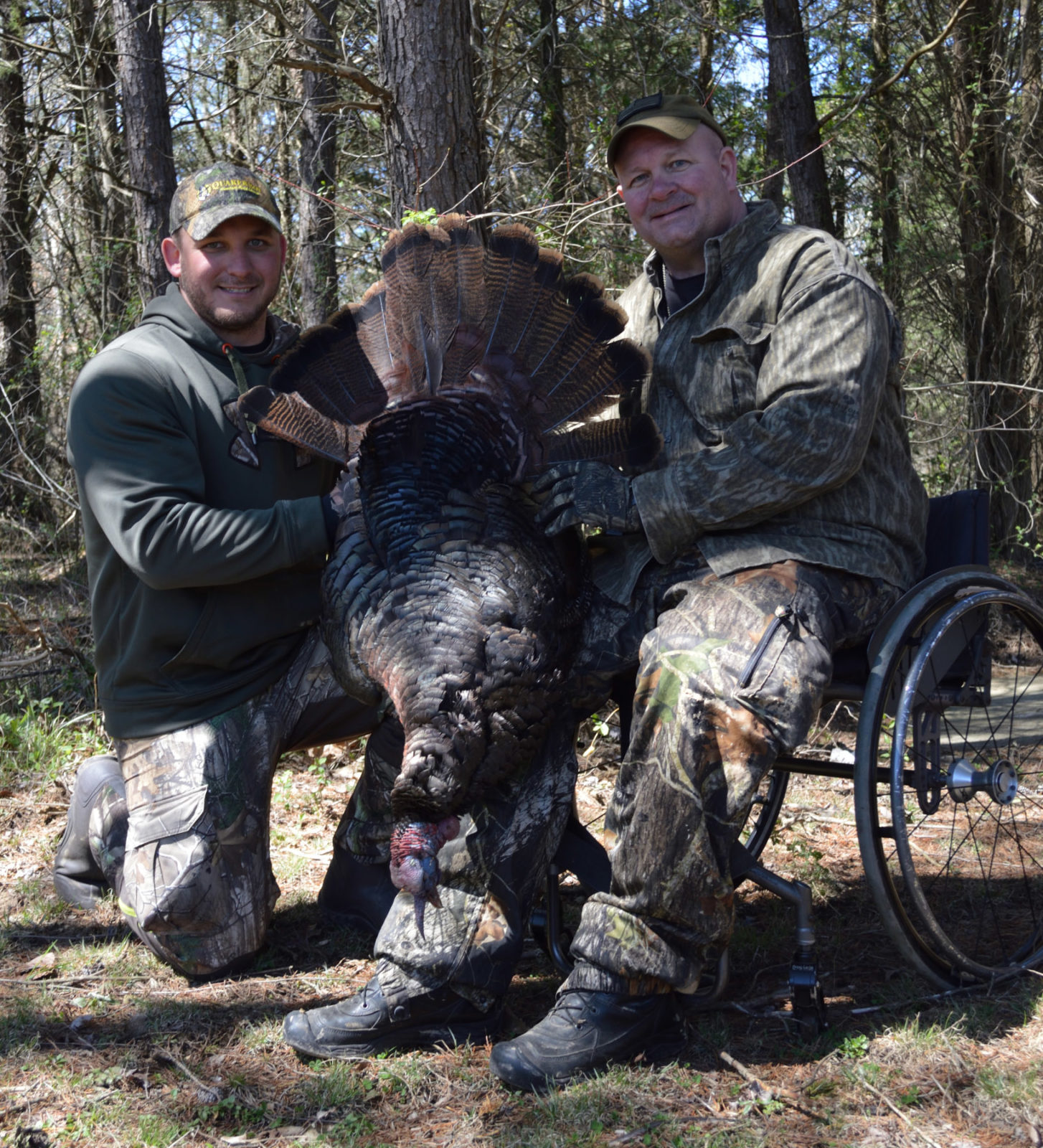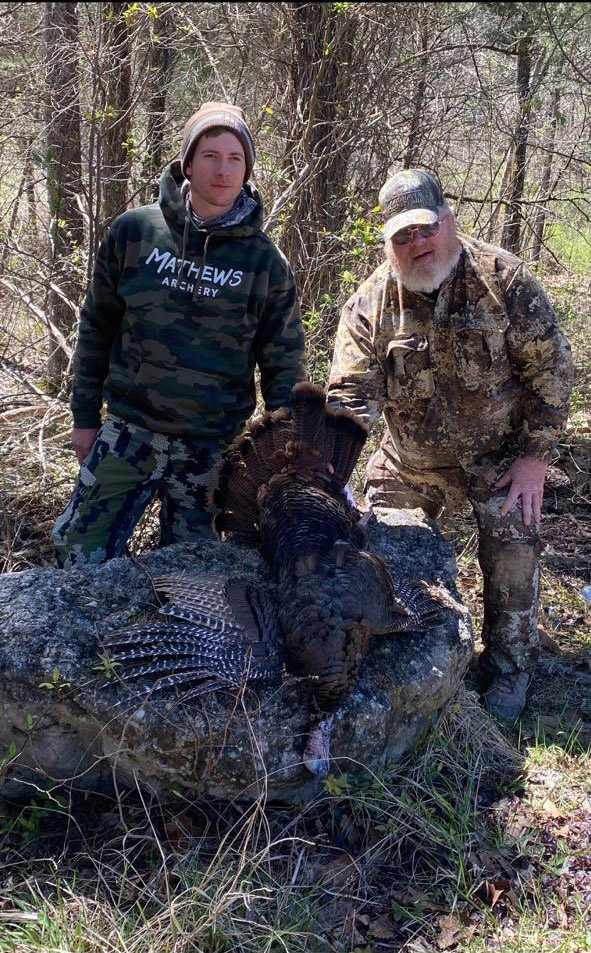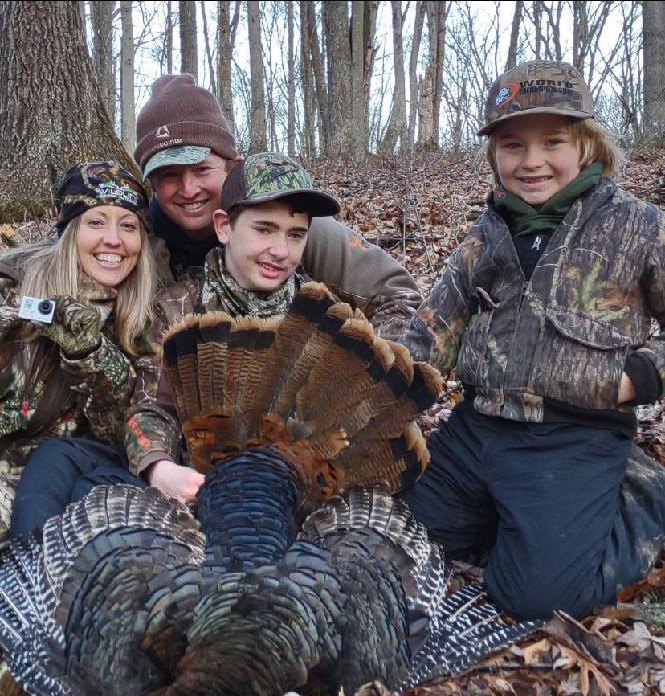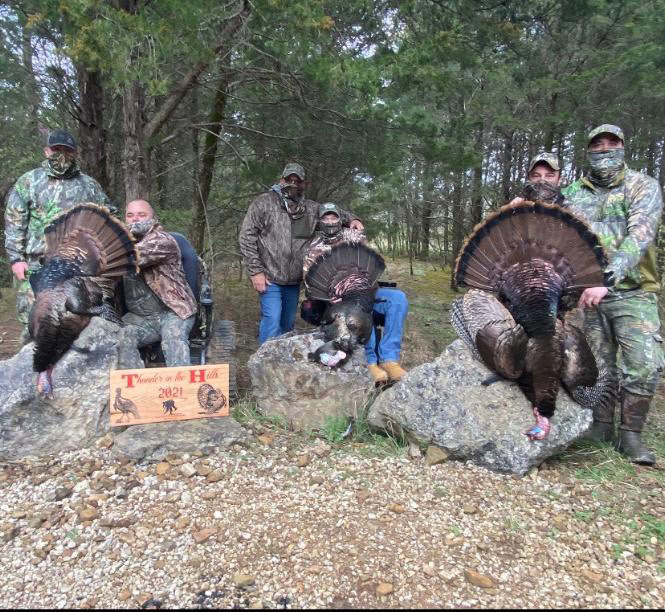
A hunter and his guide hold a harvested turkey.
“That’s a big bird,” a man whispers. A turkey struts across a field while two men hide out in a hunting blind, which is a small tent with openings meant to conceal the hunters. The other man holds a gun, breathing heavily. The turkey walks up to a decoy of another turkey, circles around it, then kicks it over. Their cover is blown. The turkey dashes back across the field.
“Kill him, kill him!” the first man whispers again. The turkey stops in the middle of the field and gobbles. “It’s alright, it’s alright, calm down. Take a breath,” he says.
A loud gunshot rings out.
These hunters are part of the Thunder in the Hills annual event that takes place at Pike State Forest in Pike County every Spring, as recorded by a YouTube video documenting the 2021 event. The event, which started in 2017, became a place for people with disabilities to hunt turkeys and participate in other activities over a weekend.
Ben Kelley, forest manager of Pike State Forest, thought of the idea for the event because of the forest trails’ accessibility to all-terrain vehicles, which could transport disabled people to their hunting spots without them needing to walk there.
“We try to make it so they have a weekend so they don’t have to worry about anything,” Kelley says. “They have no responsibilities aside from waking up in the morning and kind of gathering themselves to go out and partake in what we do.”
The main event, turkey hunting, starts at 3:30 a.m., when hunters wake up in order to get in position just as the turkeys wake up. In the middle of the night, participants get on their all-terrain vehicles along with a guide, who gives the hunters direction in hunting the bird and performs bird calls to coax the turkey to their location.
Aside from the hunt, participants are also able to fish for rainbow trout at Pike Lake. Lodging and meals are provided for everyone involved, including a highly anticipated steak dinner on Saturday. There are also raffles for anything from hats to firearms.
“There’s always somebody’s first turkey, and somebody’s first turkey is like the largest trophy you’ll ever see, especially for those who are unable to get out into the woods on their own, when they’re able to harvest a bird or have a close encounter, it makes everything worthwhile,” Kelley says. “We take it for granted that we can take off and go hiking and do whatever we want to do, but when you take somebody out who is unable to do so without a little bit of assistance and see their reaction to what we can encounter, it’s pretty joyful.”
One participant in the Thunder in the Hills event is Jeff Legg, a veteran with a disability who served in the Navy from 1978 to 1982. Legg joined the event in 2019 after hearing about it from a friend and has participated every year since.
“From daylight to dark, they have something going on for all of us,” Legg says. “There’s a whole lot of camaraderie. The people with us are unbelievable. By the time you leave, you have a couple hundred new best friends.”
Another participant is Leroy White, who calls through Google Meet wearing his full hunter attire, a camouflage shirt and hat, in his “man cave,” which contains heads of deer, turkeys, a bobcat and a bear—trophies of his previous hunting conquests.
White served in the army during the Iraq War, where he was injured in combat in 2007. Now, he works as a warrior leader for the Wounded Warrior Project, an organization that provides support to wounded veterans.
“I suffered quite a few injuries and suffered with PTSD, but of course now I do pretty good,” White says. “And I just teach other soldiers ways that I know how to deal with some of the issues that come up and triggers and everything there for their PTSD. And we take it one day at a time and we try to make it in this new society to us.”
Many other participants in the event are veterans, which makes it a great networking opportunity as well, Kelley says. Many at the event enjoy having the company of fellow veterans, which can be therapeutic and helpful for them to be around people with similar experiences and mindsets.
Many at the event enjoyed hunting before becoming disabled and being able to reconnect with one of their favorite pastimes can be an emotional experience.
“It takes you out of the everyday hustle and bustle you’re in. Being in the cities and being around people and I just have a lot of time to reflect on my life,” White says. “And where I am in life … I get peace when I’m out in the woods. There’s nobody; I can just relax. There’s no telephone ringing, there’s nobody saying ‘Leroy, come do this,’ or ‘Leroy, can you help me with this?’”
As far as improvements for future Thunder in the Hills events, Kelley says he wants to bring more people in through local advertising. He would also like the weather to cooperate more.
“The only thing you can control is the quality of the food and the quality of the fellowship,” Kelley says.
Legg, however, only has one idea for how the event could possibly be more accessible: tying the turkeys to the trees.
As for White, he intends on hunting, both as part of Thunder in the Hills and outside the event, for a long time to come.
“I know there’s gonna come a day when I’m not going to probably be able to get out there, but until that day comes, I’m gonna keep going,” White says. “If I can’t walk that far, then I guess I’ll have to get me a track chair … I’ll go any length to be able to get out in the great outdoors.”
White also expresses his thanks to the care and respect shown to him and his fellow veterans during the event, citing the posting and retiring of the colors and the raising and lowering of the American flag in a formal ceremony, as emotional moments.
“I wish there was more people to offer veterans these opportunities,” White says, commenting on how both physical disabilities and mental disorders such as PTSD can prevent veterans from participating in the activities they enjoyed before serving. “They want to do these things, go back to the woods and try to hunt but they have issues that they are dealing with that sometimes prevents them from doing it.”
The turkey goes down, and the two men scream in delight.
“YES!” the hunter’s guide yells. “Good job, brother, good job!”
The hunter is ecstatic, the skin of his nose slightly bleeding from the recoil of the gun. “I got my first turkey!” he yells in delight.




